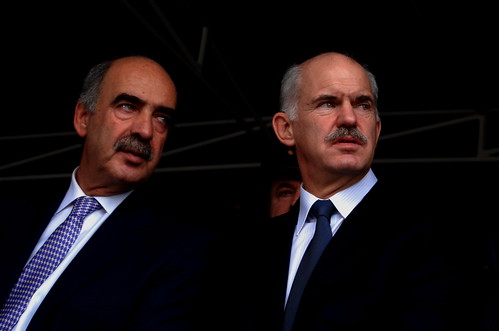His acceptance speech, which barely survived the acoustics of the room and a particularly garbled translation was met with cheers and wild applause, a reflection of Gorbachev's standing in the West following the peaceful resolution of 45 years of armed stand off which had threatened to end all life on the planet.
Likewise most of the media in Western Europe and North America was full of praise of the reforms and changes Gorbachev had instigated in the old Soviet Union and it was assumed the peoples of Russia and the other Soviet republics shared this enthusiasm.
It was only by talking with many of the ethnic Greek immigrants from places like Georgia and Armenia that I found out a different story. For many of those who left the Russian Federation in the 90's Gorbachev was a figure of hate, the man who had, in their opinion single handedly ruined the country, allowing it to fall into the hands of a ruthless mafia and a handful of venial, super rich oligarchs who ran the nation into the ground.
With the old Soviet economy now defunct and no real market economy to take its place, millions were plunged into dire poverty causing the average life span of a Russian male to drop by a nearly a decade. In addition the massive economic dislocation caused by a sudden plunge into an unregulated market economy forced millions more into exile across Europe and the rest of the world.
With the ascension of prime minister, Giorgos Papandreou to power it is easy to see similarities between his efforts to reform Greek society and his own socialist PASOK party with those of Gorbachev's to overhaul both the USSR and the Communist Party. In both case the consumate insider realised that the situation could not go on and so set in motion sweeping changes that have been praised for their boldness by outsiders, yet caused deep consternation to those directly affected. Although the worst of the economic decline Russia experienced happened after Gorbachev was ousted from power many, held him responsible for letting the genie out of the bottle.
On the other hand while most Greeks are now prefectly aware of the flaws of the country's failing economy and political system they believe that the financial measures now being rammed through parliament are a recipe for disaster and will not help the beleagured Balkan nation find its feet. With the economy in its third year of contraction, unemployment up 50% in the last 12 months, and tax revenues falling by billions there is ample empirical evidence to support gainsayers.
Giorgos Papandreou may well be able to present himself in flawless English to readers of Time magazine or CNN viewers as his country's saviour but this is a view shared by ever fewer of his fellow citizens. Like Gorbachev, Giorgos Papandreou, son and grandson of previous Greek PMs may go down in history as a leader lauded abroad and loathed at home.

1 comment:
Certainly some parallelism between Gorbachev and PM George Papandreou exists. Good point! However PMs patriotism is debatable given the poor Terms and Conditions signed off to the Troika aid package. Nevertheless, I admit that certain measures to cut public spending and deficit are bold and necessary
Dionne
Post a Comment